
Apophatic Theology

Apophatic theology is sometimes called "negative theology" (and thus poorly described in the introduction at Wikipedia). The name is derived from the Greek αποφασις which refers to denial or negation, not as "nothing" but as removal of one thing from another. Apophatic theology believes that human language, bound by human experience, fails when one attempts to describe God. The greatness of the ineffable God is diminished by any attempt to impose human labels, descriptions, or ideas upon "him," and therefore it is better not to attempt doing so.
Apophatic theology is often linked to mysticism. It has a long and distinguished tradition in Christianity. Elements can be found in the New Testament (including the concept of Incarnation as a way of making this unknowable knowable); it was further developed by the Cappadocians. The best-known exponent is Maximus the Confessor.
Apophatic theology has adherents in most theistic religions, particularly Judaism and Islam.


"[I pray for you that] you may be able to begin to grasp, as with all of God's people, the incredible dimensions, both the heights and greatness of the love of Christ that goes so far beyond description in terms of knowledge or understanding, so that you may begin to be filled with this overflowing of God."
— Paul to the Ephesians, 3.18-19, author's translation.
Sunrise, Milgro NM, Tim Vermande, December 2003.

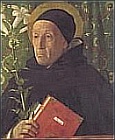
"I would be speaking as incorrectly in calling God a being as if I called the sun pale or black. God is neither this nor that . . . . whoever would say that God is good would be treating him as unjustly as though he were calling the sun black."
— Meister Eckhart von Hochheim, Sermon 9 in Bernard McGinn, Meister Eckhart: Teacher and Preacher (New York: Paulist, 1986), 256-257.
Drawing of Eckhart, http://christianmystics.com/wp-content/uploads/2007/10/meister-eckhart.jpg, presumed PD


"If the essence of religion and art could be explained, then both of them would become mere subdivisions of psychology."
— Carl Jung, "On the Relation of Analytical Psychology to Poetry" The Spirit in Man, Arts, and Literature: Collected Works 15.97-132.
"'Physical' is not the only criterion of truth: there are also psychic truths which can neither be explained nor proved nor
contested in any physical way. . . ."
— Carl Jung, "Answer to Job" Psychology and Religion: West and East: Collected Works 2
Photograph of Carl Jung, LoC vc008302, PD

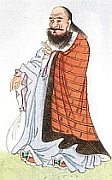 "The Tao that can be told of is not the eternal Tao;
"The Tao that can be told of is not the eternal Tao;
The name that can be named is not the eternal name. . . .
Tao is empty like a bowl;
It may be used but its capacity is never exhausted. . . .
Deep and still, it appears to exist forever."
— Lao Tzu, Tao Te Ching, translated by Wing-Tsit Chan, A Source Book in Chinese Philosophy (Princeton: Princeton University Press, 1963)
Drawing of Lao Tzu, E. T. C. Werner, Myths and Legends of China, 1922, PD.

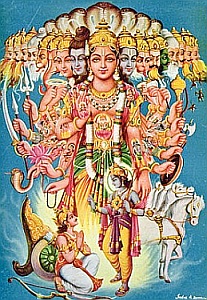
"As I looked, a stormy wind came out of the north: a great cloud with brightness around it and fire flashing forth continually, and in the middle of the fire, something like gleaming amber.... this was the appearance of the likeness of the glory of the Lord. When I saw it, I fell on my face."
— Ezekiel 1.4-28, NRSV.
"When Krishna, the God of Yoga, had thus spoken, O king, he appeared then to Arjuna in his supreme divine form. And Arjuna saw in that form countless visions of wonder; eyes from innumerable faces, numerous celestial ornaments, . . . . the infinite divinity was facing all sides . . . . if the light of a thousand suns suddenly arose in the sky that splendor might be compared to the radiance of the Supreme Spirit. . . . Trembling with awe and wonder, Arjuna bowed his head . . . ."
— Bhagavad Gita 11.9-14. Lost track of which translation.
Arjuna's vision, http://commons.wikimedia.org/wiki/File:Krishna-arjuna-cleanup.jpg, PD

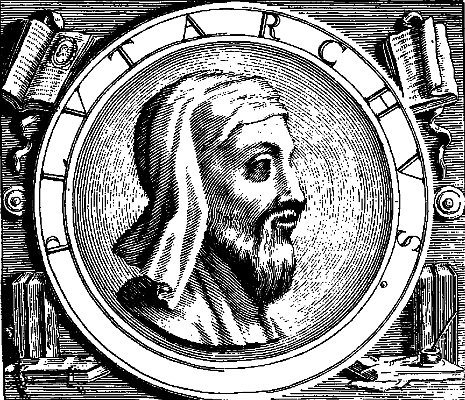
"Therefore he (Apollo) proposes and sends out problems that use our reason to those who hold a philosophical nature, which creates in the soul a search for the truth, . . . because the origin of philosophy is seeking truth, and because wonder and not knowing is the beginning of seeking, it is only proper that the divine should be presented to us as an enigma."
— Plutarch, De E Apud Delphos 384, 385, author's translation.
"In same way as a rainbow is a reflection of the sun . . . so are these stories a reflection of the power of reason by which we open the way to exploration."
— Plutarch, De Iside et Osiride 358, 359, author's translation.
Engraving of Plutarch, from Amyot's Parallel Lives, 1565, http://en.wikipedia.org/wiki/File:Plutarch.gif, PD

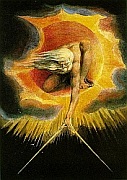 ". . . you ought to know that what is grand is necessarily obscure to weak men. . . . The wisest of the ancients considered what is not too explicit as the fittest for instruction, because it rouses the faculties to act."
". . . you ought to know that what is grand is necessarily obscure to weak men. . . . The wisest of the ancients considered what is not too explicit as the fittest for instruction, because it rouses the faculties to act."
— William Blake to Dr. Trusler, August 23, 1799 (spelling modernized).
". . . we humans are no more equipped to understand God or the afterlife or the universe and how they all relate any better than my dog has the ability to understand accounting."
— Steve Russell to Tim Vermande, October 6, 2009.
William Blake, Ancient of Days, 1794, http://www.ibiblio.org/wm/paint/auth/blake/ancient.jpg, PD

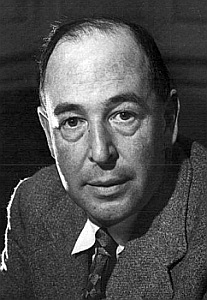
"At the name of Aslan each one of the children felt something jump in its inside. . . . 'if there's anyone who can appear before Aslan without their knees knocking, they're either braver than most or else just silly.' . . . . ''Course he isn't safe. But he's good.'. . . People who have not been in Narnia sometimes think that a thing cannot be good and terrible at the same time."
— C. S. Lewis, The Lion, the Witch, and the Wardrobe in The Chronicles of Narnia, 141, 146, 168.
"I often wonder whether Merlin doesn't represent the last trace of something the later tradition has quite forgotten about — something that became impossible when the only people in touch with the supernatural where either white or black, either priests or sorcerers" (374).
"... if it had ever occurred to her to question whether all these things might be the reality behind what she had been taught at school as religion..." (575)
"...the real causes of all the principal events aren't quite unknown to historians, that indeed is why history has not yet succeeded in becoming a science" (598)
"The laws of the universe are never broken. Your mistake is to think that the little regularities we have observed on one planet for a few hundred years are the real unbreakable laws, whereas they are only the remote results which the true laws bring about more often than not, as a kind of accident" (710).
— C. S. Lewis, That Hideous Strength, in The Space Trilogy (New York: QPBC, 1997).
Photo of C. S. Lewis: Arthur Strong, 1947, http://commons.wikimedia.org/wiki/File:C.s.lewis.JPG, used by terms of permission

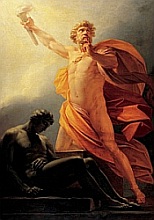
"The day will come when, after harnessing the ether, the winds, the tides, gravitation, we shall harness for God the energies of love. And, on that day, for the second time in the history of the world, man will have discovered fire."
— Teilhard de Chardin
"The great message that we have to carry . . . is that God loves us not because of what we do or accomplish, but because God has created and redeemed us in love and has chosen us to proclaim that love as the true source of all human life."
—Henri J. M. Nouwen, In the Name of Jesus
(New York: Crossroad, 1997), 17
Heinrich F. Fuger, Promtheus, http://commons.wikimedia.org/wiki/File:Heinrich_fueger_1817_prometheus_brings_fire_to_mankind.jpg

revised 26 June 2020; original 26 July 2009.

